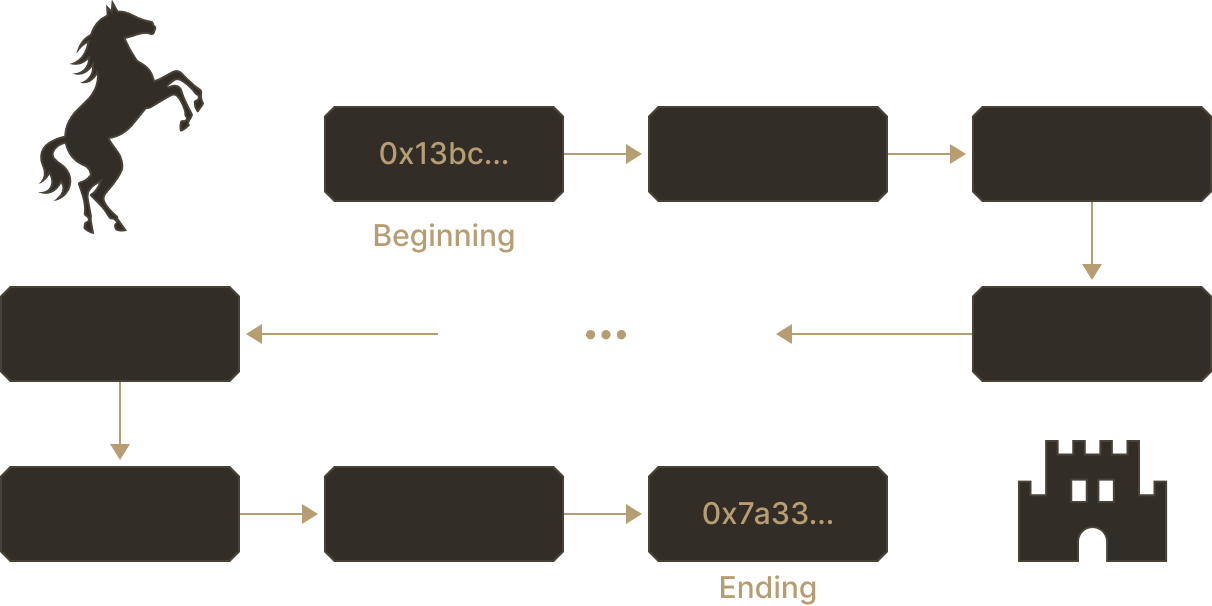
Standalone
Interactive Fraud Proofs

Part II
A Practical Example: Optimistic Ballads
Let us reinforce our understanding of interactive fraud proofs by studying an optimistic system and playing a real challenge game.
Stories, Steps & Paths
First, we need to invent some fictitious computation we want our optimistic system to emulate.
A story is represented by a bytes32 value. It can be advanced by hashing it with 1 of 5 possible steps: None, Up, Down, Left, Right.
enum Step {
None,
Up,
Down,
Left,
Right
}
/// @notice Advance a story by taking a step
function takeStep(bytes32 story, Step step) returns (bytes32) {
return keccak256(abi.encode(story, step));
}

A Path is a sequence of steps (e.g., [Up, Up, Left, ..., Down]). When a story progresses along a path, it is repeatedly hashed with each step in the path.
/// @notice Advance a story by taking a path
function takePath(
bytes32 story,
Step[] memory path
) returns (bytes32) {
for (uint i = 0; i < path.length; i++) {
story = takeStep(story, path[i]);
}
return story;
}
Given a story's beginning and a path, computing the story's ending on-chain can be expensive, especially if the path is too long.

Optimistic Stories
BanditBallad wishes to tell a story. But instead of computing the entire story on-chain, BanditBallad will let an off-chain entity propose the story's ending. Then, any individual is free to dispute the proposed story's ending by initiating a challenge. After 7 days, if no one has successfully disputed the proposed value, the story's ending is assumed to be correct.
The path for the story is given by the following array.
[
Up, Up, Down, Down, Left, Right, Left, Right,
Up, Up, Down, Down, Left, Right, Left, Right,
Up, Up, Down, Down, Left, Right, Left, Right,
Up, Up, Down, Down, Left, Right, Left, Right,
Up, Up, Down, Down, Left, Right, Left, Right,
Up, Up, Down, Down, Left, Right, Left, Right
]
Challenge Game
A Challenge contract is deployed when a challenge is initiated on BanditBallad. Challenge is an implementation of the multi-round challenge game we have detailed before, where the challenger and defender agree on a single step to verify on-chain.
The challenger calls
challengeStoryto propose the search space's middle segment.The defender calls
defendStoryto either agree or disagree with the challenger.Repeating steps 1-2, the challenger and defender will eventually find the earliest step which they disagree on.
At this point, anyone can call
resolveto compute the single step result on-chain, and decide which player is correct.
Your Task
Study BanditBallad, Challenge, and Path. Try to understand how a successful Challenge can prove that a proposed story's ending is incorrect.
Then, deploy BanditBallad and initiate a successful challenge!
When BanditBallad is deployed, it is initialized with an incorrectly proposed ending.
Contract Code
// SPDX-License-Identifier: MIT
pragma solidity ^0.8.19;
import "./Challenge.sol";
import "./Path.sol";
contract BanditBallad {
Path public immutable path;
bytes32 public immutable beginning;
bytes32 public ending;
address public proposer;
Challenge public challenge;
uint256 public challengeWindowEnd;
event ChallengeCreated(address challengeAddress);
event ChallengerLoses();
event ChallengerWins();
/**
* @notice Create a new ballad.
* @param _path The path the story should follow.
* @param _proposedEnding The proposed ending of the story.
*/
constructor(Path _path, bytes32 _proposedEnding) {
proposer = msg.sender;
path = _path;
beginning = keccak256("ballad.start");
ending = _proposedEnding;
// Everyone is given 7 days to challenge the proposed ending
challengeWindowEnd = block.timestamp + 7 days;
}
/**
* @notice Initiate a new challenge
* @param _challengerEnding The challenger's ending
*/
function initiateChallenge(bytes32 _challengerEnding) external {
require(block.timestamp < challengeWindowEnd, "Challenge window over");
require(ending != bytes32(0), "No ending proposed");
// Deploy a challenge contract
challenge = new Challenge(
msg.sender,
proposer,
beginning,
ending,
_challengerEnding,
path
);
emit ChallengeCreated(address(challenge));
}
/**
* @notice Resolve an existing challenge.
* The challenge must be resolveable.
*/
function resolveChallenge() external {
require(address(challenge) != address(0), "No challenge initiated");
Challenge.Result result = challenge.resolve();
if (result == Challenge.Result.DefenderWon) {
// If the challenger loses, do nothing
emit ChallengerLoses();
} else {
// If the challenger wins, the proposed ending is rejected
delete ending;
emit ChallengerWins();
}
}
}// SPDX-License-Identifier: MIT
pragma solidity ^0.8.19;
import "./Path.sol";
contract Challenge {
enum Result {
ChallengerWon,
DefenderWon
}
bytes32 constant NULL = bytes32(0);
uint256 constant TIMEOUT_WINDOW = 12 hours;
address public immutable challenger;
address public immutable defender;
// The stories asserted by the challenger and defender
mapping(uint256 => bytes32) public challengerStory;
mapping(uint256 => bytes32) public defenderStory;
// The path the story should follow
Path public path;
// Binary search boundaries
uint256 L;
uint256 R;
// Latest timestamp before an action time out
uint256 timeout;
/**
* @notice Create a new challenge.
*/
constructor(
address _challenger,
address _defender,
bytes32 _beginning,
bytes32 _challengerEnding,
bytes32 _defenderEnding,
Path _path
) {
require(
_challengerEnding != _defenderEnding,
"Challenger must disagree with defender"
);
uint256 numSteps = _path.getNumSteps();
(challenger, defender) = (_challenger, _defender);
(L, R) = (0, numSteps); // The initial search space is [0, numSteps]
// Both parties agree on the story's beginninng
challengerStory[0] = _beginning;
defenderStory[0] = _beginning;
// But disagree on the story's ending
challengerStory[numSteps] = _challengerEnding;
defenderStory[numSteps] = _defenderEnding;
path = _path;
}
/**
* @notice The challenger proposes what a segment of the story should be.
* The segment to challenge is in the middle of the search space.
* (i.e., between L and R)
*/
function challengeStory(bytes32 story) external {
require(msg.sender == challenger, "msg.sender != challenger");
require(isSearching(), "Binary search finished");
uint256 bisectionStep = getBisectionStep();
require(challengerStory[bisectionStep] == NULL, "Story already challenged");
challengerStory[bisectionStep] = story;
timeout = block.timestamp + TIMEOUT_WINDOW;
// In the real world, the defender is an off-chain entity.
// For this quest, the defender is simulated by an on-chain contract.
_simulateDefender();
}
/**
* @notice The defender responds to the challenger.
* Either agreeing with the challenger, and moving the search right,
* Or disagreeing with the challenger, and moving the search left.
*/
function defendStory(bytes32 story) external {
require(msg.sender == defender, "msg.sender != defender");
require(isSearching(), "Binary search finished");
uint256 bisectionStep = getBisectionStep();
require(challengerStory[bisectionStep] != NULL, "Story not challenged");
require(defenderStory[bisectionStep] == NULL, "Story already defended");
defenderStory[bisectionStep] = story;
timeout = block.timestamp + TIMEOUT_WINDOW;
// Update binary search bounds
if (challengerStory[bisectionStep] == defenderStory[bisectionStep]) {
L = bisectionStep; // Agree
} else {
R = bisectionStep; // Disagree
}
}
/**
* @notice Returns the result of the challenge.
* The challenge must be resolveable, either by timeout or verification.
*/
function resolve() external view returns (Result) {
// If binary search not finished, check for timeout
if (isSearching()) {
require(block.timestamp > timeout, "Binary search still ongoing");
uint256 bisectionStep = getBisectionStep();
if (challengerStory[bisectionStep] == NULL) {
// Challenger timed out, Defender won
return Result.DefenderWon;
} else {
// Defender timed out, Challenger won
return Result.ChallengerWon;
}
}
// Else, binary search finished, verify single step
bytes32 nextStory = path.step(defenderStory[L], L);
if (nextStory == defenderStory[R]) {
return Result.DefenderWon;
} else {
return Result.ChallengerWon;
}
}
/**
* @notice Returns true if binary search is still ongoing.
* Returns false otherwise.
*/
function isSearching() public view returns (bool) {
return L + 1 != R;
}
/**
* @notice Returns the middle index in the search space.
* (i.e., between L and R)
*/
function getBisectionStep() public view returns (uint256) {
return (L + R) / 2;
}
/**
* @notice Triggers the defender to respond to the challenger.
* In the real world, the defender is an off-chain entity.
* But for this quest, we automate the defender as an on-chain contract.
*/
function _simulateDefender() private {
(bool success, ) = defender.call("");
require(success, "defender failed");
}
}// SPDX-License-Identifier: MIT
pragma solidity ^0.8.19;
contract Path {
enum Step {
None,
Up,
Down,
Left,
Right
}
Step[] public steps;
constructor(Step[] memory _steps) {
steps = _steps;
}
/// @notice Advances a story forward by one step.
function step(bytes32 _story, uint256 _stepNumber)
external
view
returns (bytes32 nextStory)
{
return keccak256(abi.encode(_story, steps[_stepNumber]));
}
/// @notice Return the length of the path (i.e., number of steps).
function getNumSteps() external view returns (uint256) {
return steps.length;
}
}
In truth, the Bandit King was an honorable hero, not keeping a single penny he stole. So poor that he could not save his sick wife.